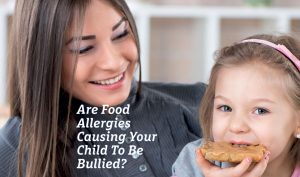
Allergy bullying is a growing problem that experts’ warn can cause deadly effects. In fact, parents of children with food allergies are being warned to watch for signs of ‘allergy bullying’ which Dr. Sandra Hong, M.D., Allergist at Cleveland Clinic (USA) says are commonplace in schools.
BULLYING BEHAVIORS
Research, according to Dr. Hong, has learned that around one third of children with food allergies report being targeted by bullies. She elaborates, “Comments like ‘I’m going to hide peanut butter in your food’, were amongst the incidents reported.” In fact, perpetrators may threaten or taunt their victims with potentially dangerous foods such as peanuts or peanut butter. Dr. Hong stresses that parents’ whose offspring reported being bullied about a food allergy must contact the school and insist on staff intervention.
HIDDEN SIGNS
Unfortunately, many children targeted based on their particular food allergies often don’t report such incidents to their parents. Therefore, understanding the warning signs is critical for parents’, some of which include: being sad, withdrawn, upset, or a change in normal behavior. Dr. Hong adds that if the child suddenly develops an aversion to going to school out of the blue, parents’ need to get to the bottom of the problem. If there’s something more, something deeper, she advises parents’ to maintain open communication at all times in order to deal with these kinds of situations.
EMOTIONAL IMPACT
The American Academy of Pediatrics investigated allergy bullying to understand its emotional impact on children. Testimonies from a number of kids’ with serious food allergies found that bullying was common and usually involved threats linked to food. The researchers reported the bullied food-allergic children suffered from greater anxiety and a compromised quality of life. However, parental awareness of the bullying was linked with enhanced emotional and social coping skills in more than half of the cases.
UNDERSTANDING FOOD ALLERGIES
A food allergy is a reaction by the body to a food item, most commonly milk, eggs, peanuts, wheat, soy, tree nuts, and fish. Symptoms of a food allergy include a tingling sensation in the mouth, swelling of the tongue and throat, hives, vomiting, abdominal cramps, difficulty breathing, diarrhea, a drop in blood pressure, and loss of consciousness.
THE BODY DURING FOOD ALLERGY
A food allergy is caused when the body’s immune system mistakes an ingredient in food—usually a protein—as harmful and creates a defense system (special compounds called antibodies) to fight it. An allergic reaction occurs when the antibodies are battling an “invading” food protein. Although a person could have an allergy to almost any food, the following eight foods account for almost 90 percent of all foodrelated allergic reactions: milk, eggs, peanuts, tree nuts (such as cashews and walnuts), fish, shellfish, soy, and wheat.

